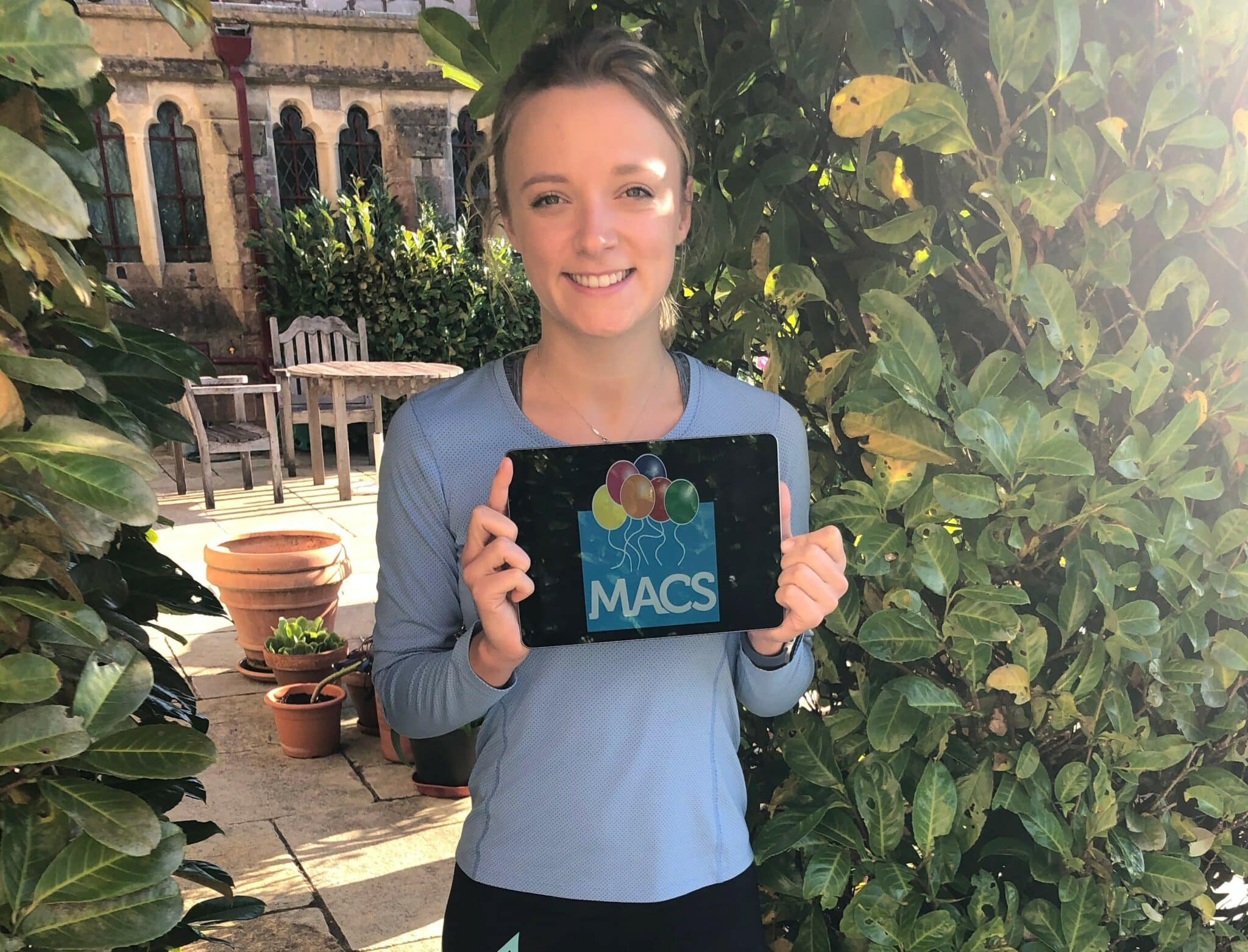Exciting news for our chiropractor, Amelia who has won a place to run in the 2020 London Marathon!
Amelia will be running for MACS (www.macs.org.uk), a fantastic charity that supports children born with either no eyes at all or underdeveloped eyes. Amelia has a personal connection to the charity as her younger cousin Macy-Rose, age 9, was born with an optic disc coloboma of her left eye and has been supported by the MACS team. “MACS has been a fantastic resource and support to Macy-Rose and the family. It might not be a charity familiar to many but to those it helps and supports, it really is invaluable. I hope I can do them proud and raise the money they need to continue providing their amazing services.”

Amelia is aiming to raise £2000 before the race takes place next year. A keen runner, Amelia will be documenting her journey, including her training schedule, exercise tips and advice to help fellow runners and others who are undertaking the prestigious race: “Being a chiropractor, I’m well-aware of the amazing benefits of running and keeping fit and active, but I’m also conscious that it does require the right strengthening, stretches and training plan to make sure I stay on track to complete the race in April. Hopefully through sharing my journey I’ll be able to help others who are also participating in their own running challenges.”
Donations can be made at https://www.justgiving.com/fundraising/amelia-laxton2
We’ll be sharing updates to this blog as Amelia shares her journey, advice and tips over the coming months, along with sharing updates on our social media pages too, using the hashtag #ameliasrun
We’d love to hear from you if you are running next year’s marathon too!
My Training Journey by Amelia
8 WEEKS TO GO!
With just 8 weeks to go, the excitement/nerves are starting to build and I’m just praying for good conditions on the day! As part of my training this weekend I am running the London Vitality Half Marathon. Some of the route on Sunday is similar to the London Marathon route so it will be great practise and hopefully a confidence boost if all goes to plan. I’m treating this half marathon as a training run as I am not able to taper in the way I usually would due to the marathon training schedule, but I’m looking forward to it nonetheless.
I previously discussed the importance of carbohydrates for runners however protein is equally important for different reasons! Protein is a key element of muscle, bone, ligaments and tendons while also playing a role in lots of metabolic processes such as promoting a healthy immune system. As well as this, distance runners need protein to repair and remodel muscle which then allows you to improve your strength and endurance. Research suggests that having protein within 90 minutes of an aerobic or anaerobic training session causes increased muscle healing and remodelling which as a result improves muscular endurance. Examples of some good sources of high quality protein include eggs, chicken, turkey, quinoa, lentils, chickpeas and almonds. So bear this in mind if you are doing longer runs or any endurance sport e.g. cycling, rowing etc and ensure you’re providing your body with enough protein to repair and improve your muscles!
As always, any sponsorship to reach my £2000 target for MACS charity it greatly appreciated!
MONTH 1 COMPLETE
My first month of training is complete and overall it’s been a successful one! I’ve managed to do 110 miles of running in January and I’m starting to feel the benefits in my pace and fitness. I’ve been concentrating on my nutrition in the last month as increased mileage means I’m hungry all the time! A common cause of fatigue, lack of energy and illness during running training is a lack of good nutrition – you wouldn’t expect your car to get you from A to B without the correct fuel and our bodies are no different! For any form of distance running wholegrains, nuts, fruits and vegetables are a great source of carbohydrate and therefore slow release energy. For example – the breakfast I swear by before any long training run or race is porridge with pecans and maple syrup – quick to make, filling and easy to digest.
Other great sources of healthy carbohydrates include wholewheat pasta, quinoa, brown rice, sweet potato, butternut squash, apples, bananas, lentils, chickpeas and most nuts. By having plenty of carbohydrate rich foods during training you can increase the glycogen stores in the muscles meaning you can run for longer before hitting the dreaded ‘wall’. When you hit the ‘wall’, all that is happening is your body is starting to metabolise fat for energy because your muscles have used up all the glycogen stores. Fat metabolism is a less efficient process and therefore you start to feel fatigued. So fill up those stores and avoid that dreaded feeling because who doesn’t want an excuse to eat more carbs! In the next blog I’ll be discussing the role of protein for running.
16 WEEKS TO GO!
16 weeks means 1 thing… the beginning of my official marathon training schedule! I find a schedule invaluable when training for a marathon as it keeps me accountable and ensures I’m doing all the correct forms of training. There are lots of different training schedules you can easily find online and my schedule is combination of the London marathon intermediate plan and a plan from the book ‘Advanced Marathoning’. Put simply, I am aiming to do 1 short run (2-4 miles), 1 medium run (4-8 miles) and a long run (8+) per week plus a cross training session. Training schedules really don’t have to be complicated or daunting so try to keep it as simple as possible! Long runs will start at 8 miles in week 1 and will eventually peak at 23 miles on week 14. Week 15 will be slightly shorter and then week 16 will be a taper week to prepare for the marathon itself.
When training for any distance event its vital to do more than just run. Cross-training can be anything from lifting weights to spinning to going for a swim. Some sort of resistance training is important to keep the muscles strong, efficient and most importantly, injury free, and it also breaks up the monotony of training for a distance run. Personally, I do resistance training using hills. Hill sprints use your own body weight to strengthen the leg musculature whilst also increasing V02 max capacity. V02 max is the maximum amount of oxygen your body can utilise during exercise so it’s vital for any distance runner. Again – don’t complicate it, just find a steep consistent hill and set a target to run a section of the hill a number of times – for example – 8 cycles of running up at 80-90% of your max effort and then jog down to recover 20-30% of max effort. Then have a short break 30 secs-1 min depending on the length of the hill.
I would love hear from anyone who is also training for a spring run whether it’s a 5k or an ultra marathon – you can find me on Facebook @amelialaxtonchiro or on Instagram @therunningchiropractor. May be your new years resolution is to start running? If so good luck and happy running – and if you need any advice feel free to contact me or use the advice on my social media pages! Happy running!”
19 WEEKS TO GO!
20 WEEKS TO GO!
“This past week has been a great week! As I mentioned previously I was running the Nottingham Christmas Half Marathon on Sunday as part of my training for London and so I did 2 short training runs this week to taper for the race. Tapering is really important to ensure optimal rest and recovery from training before the race. To put simply, tapering corrects the accumulated wear and tear of training and improves running economy and muscle strength. It also allows your body to fully replenish the glycogen stores in your muscles and liver. In order to encourage this process it’s important to consume a high carbohydrate diet for the 3 days before a long race. Some of these foods include rice, pasta, bread, potato, bagels, and corn.
I did all this and it obviously worked as I managed to achieve a personal best time of 1 hour 36 minutes! I’m really pleased with this time and it has spurred me on to stay on track with my marathon training.
Don’t forget you can sponsor me and my chosen charity MACS by using this link.. thanks in advance!”

21 WEEKS TO GO!
This week I found out that I managed to get a ‘Good for Age’ place for the London Vitality Half Marathon! To qualify you had to have run a half marathon in under 1 hour 45 minutes in the last year. This meant that the half marathon I did last March qualified me for a place which was a pleasant surprise! This half takes place on 1st March 2020 just 6 weeks before the London Marathon – this is perfect timing to focus my training in the few months leading up to the marathon and a good opportunity to practise my marathon pace on a run around London itself! The race is now full but there are still charity places available – https://www.thebighalf.co.uk/
I’m also running the Nottingham half marathon this Sunday (1st December), the day after our work’s Christmas party – so wish me look!
As mentioned in previous posts, I’m running this marathon for MACS charity – if you would like to read my story and donate here’s the link
22 WEEKS TO GO
I have had a great week of running and did an excellent track session with the club – 8x800m was tough going but I felt great afterwards! In the last couple of weeks I have also signed up for lots of local running events to keep me motivated and on track over the next 5 months (Go on to the Racebest website where all the local events are listed and you can sign up – https://racebest.com) Currently I have signed up for 4 of the PECO XC races which take place over the next few months – these are all local cross-country races between 4 and 5 miles long – I’ve been told they’re very muddy but great fun!. I have also signed up for the Dewsbury 10k on 2nd February 2020 which is meant to be an “out and back road course that is fast and flat!”
As mentioned above, I’m running this marathon for MACS charity – if you would like to read my story and donate here’s the link.
23 WEEKS TO GO!
With 23 weeks to go I am starting to feel very excited about the prospect of running the prestigious London Marathon! I have just bought a book recommended to me by a friend from my running club called ‘Advanced Marathoning’ and I’m hoping this is going to give me all the answers and help me reach my goal of sub 3 hours 30 minutes (a whole 15 mins quicker than my last marathon in York 2019 – definitely a challenge!). I have not got my firm training schedule in place yet as most marathon schedules are 16-18 weeks long, however I am starting to build up a steady base level of fitness with consistent running each week. It is important to do a variety of training when preparing for a marathon and so I am currently doing :
- 1 mixed session per week – either hill sprints, interval training or track sessions
- 1 mid length run – between 6-9 miles
- 1 long run – over 9 miles
- 1 strength/conditioning session – usually a ‘body pump’ weight based class
I do two of these runs with my running club the Valley Striders as I find it much more motivating to run with a club and have really noticed an improvement in my pace. You also pick up lots of hints and tips from other (much better) runners!


